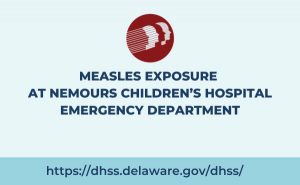National Influenza Vaccination Week Dec. 4 – 10, 2016: It’s Not Too Late to Get A Flu Shot
Division of Public Health | Newsroom | Date Posted: Tuesday, December 6, 2016
With flu activity increasing and family and friends planning gatherings for the holidays, now is a great time to get a flu vaccine if you have not yet done so. An annual flu vaccine is the best way to protect you and your loved ones, against the effects of this virus. People of every age, including people in good health, are at risk of flu. That’s why the Division of Public Health (DPH) encourages everyone 6 months of age and older to get a flu vaccine every season. December 4 -10, 2016 is National Influenza Vaccination Week (NIVW).
Delaware Events Mark Wold AIDS Day
Division of Public Health | Newsroom | Date Posted: Tuesday, November 29, 2016
Dec. 1, 2016, marks the 29th anniversary of World AIDS Day. The theme this year is, “Leadership. Commitment. Impact.” World AIDS Day provides an opportunity for people worldwide to unite in the fight against human immunodeficiency virus (HIV), to show their support for people living with HIV, and to commemorate those lost to the disease.
14 Severely Neglected Dogs Rescued in Millsboro by the Office of Animal Welfare; Dogs Recovering at Brandywine Valley SPCA
Division of Public Health | Newsroom | Date Posted: Monday, November 28, 2016
As friends and families were gathering for the Thanksgiving holiday on Wednesday, Nov. 23, 2016, Division of Public Health Office of Animal Welfare officers were able to rescue 14 severely emaciated and neglected dogs from a Millsboro property. Delaware Animal Services (DAS), the state’s animal control and cruelty enforcement unit, received a tip regarding several neglected dogs, as well as dogs running loose in a wooded area. Officers responded to capture the loose dogs, who were in poor condition, and to interview concerned residents about the state of the animals left on the property. Officers obtained a search warrant and upon entry, observed numerous emaciated dogs that needed immediate medical attention and four deceased dogs on the property. The property appeared to be neglected and there was no evidence of food or water for the animals.
Zika: Holiday Travel? Pack Your Bug Spray
Division of Public Health | Newsroom | Date Posted: Tuesday, November 22, 2016
As temperatures drop outside and holiday travel plans to warmer climates heat up, the Division of Public Health (DPH) reminds you that as Zika is being found in an increasing number of countries stopping a mosquito bite is still the best protection against the disease. Packing bug spray and clothing that protects against mosquito bites is as important as packing sunscreen and a bathing suit. Delaware now has 16 Zika cases, including one not previously announced in an adult male with travel back and forth to Puerto Rico. All cases were caused by mosquito bites while traveling abroad. All but one of the Delaware Zika cases are in adults and none is pregnant. Of the 16 Delaware cases, nine are in New Castle County, three are in Kent County and four are in Sussex counties.
The Secret to a Healthy Thanksgiving: It’s All About Balance!
Division of Public Health | Newsroom | Date Posted: Friday, November 18, 2016
Many of us look forward to our annual Thanksgiving feast. Who doesn’t like to over indulge in stuffing, mashed potatoes, and a selection of pies? But this annual tradition is the start of the holiday eating season which often leads to weight gain of a pound or more that often does not leave when the holidays do! So what can you do? The Division of Public Health (DPH) is encouraging everyone to make a healthy holiday plan now, that balances calorie intake with exercise.












































































